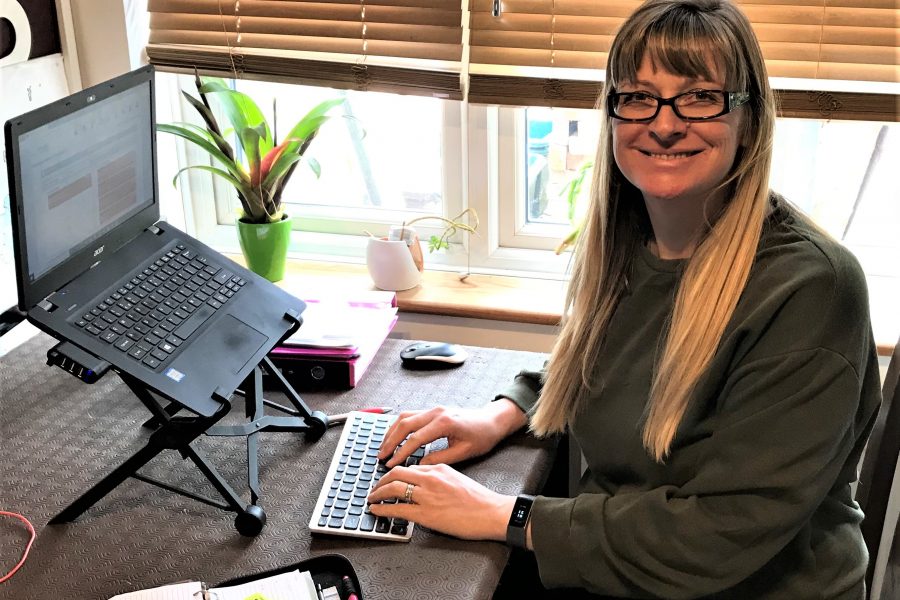We’re running a series of blogs from our members of staff who are continuing to work with vulnerable children and young people during the current COVID-19 crisis. Some staff are working directly with young people in our frontline housing services and others are continuing their vital work virtually.
Next in the series is Hannah, a counsellor for our Heads Together free counselling service for 14-24-year-olds. She tells her story, in her own words:
What’s your job and how long have you worked for YMCA East Surrey?
I’m a counsellor and CBT (Cognitive Behavioural Therapy) trainee for YMCA’s Heads Together counselling service. I started in January 2019 and was employed under the ‘Recruit to Train’ IAPT (Improving Access to Psychological Therapies) programme.
What’s the best thing about your job?
I love meeting and working with a wide variety of clients and feeling like I have been able to help them in some way. I also love learning and developing my skills, so am hugely grateful for the opportunity to be studying and working at the same time.
How has your job changed under lockdown?
I’ve had to learn new ways of working with clients using technology. I am no longer seeing any clients face to face but instead have been using a video conferencing service which allows me to see and speak to my clients whilst maintaining safe practice.
Whilst it was challenging at first to adapt to this way of working, it has enabled me to develop my skills to work confidently as an online counsellor. I have also learnt ways of sharing material/documents with clients online to enhance sessions and I will continue to do this even after lockdown has ended.
Describe a typical day…
One reason I love this job is that I don’t really have a ‘typical day’ as 2 days are rarely the same. However, the most typical day might include one or two assessment sessions with potential new clients along with two or three client sessions, plus preparation for these meetings and routine admin work.
Assessment sessions involve meeting with a new referral to the service, giving them information about Heads Together and counselling in general and gaining more information from them about what they would like help with. Between us, we then decide if we think counselling is appropriate, or if another service would be more suitable.
Client sessions are my regular weekly sessions. I either see clients for counselling or for CBT sessions. Counselling sessions allow the clients to talk freely about whatever they want to bring to the session. This may be a problem they have experienced that week or an ongoing issue. CBT sessions are more structured, usually with a set agenda and working on an identified problem, but this can be adapted depending on what the client brings each week.
What are the new challenges that the young people you work with are facing?
The most surprising thing for me has been how well many young people have adapted to the change and for a few, it has actually reduced some of their concerns. For example, many young people experience social anxiety which is exacerbated by school pressures and other social activities. Lockdown has reduced this pressure, thus reducing their social anxiety.
However, as time has gone on some young people are now starting to worry about when lockdown will end and when they will be expected to return to school and other everyday activities. This worry or uncertainty is causing their anxiety to re-surface.
Being able to talk openly about these worries and acknowledge them without fear of judgement is sometimes enough to help. Other young people appreciate psychoeducation about what anxiety is and why we have it and benefit from learning some techniques to help them cope better with uncertainty.
Have you had any particularly memorable moments at work since lockdown began?
I’ve been getting to speak to families of young people on our waiting list to arrange initial assessment appointments. I’ve really enjoyed speaking with the parents/carers of the clients who had been referred to our service. I don’t normally have any/much contact with family members so it was nice to get to speak to them.
What advice would you give to young people during lockdown?
What I have learnt so far is that everyone’s situation is unique. We may all be living through the same time in history but we will not all be having the same experience. For some people, having more time at home with family, away from the pressure of school and exams and being able to binge-watch Netflix might feel awesome. But for others being around family might be the last place they want to be and school might have been the one place they did feel safe or have support. I’m reluctant to give any advice other than to say, it is ok not to be ok, and this can change on a daily, even hourly, basis so be kind to yourself.
——
IF YOU WOULD LIKE TO SUPPORT YMCA EAST SURREY’S WORK, PLEASE DONATE HERE











